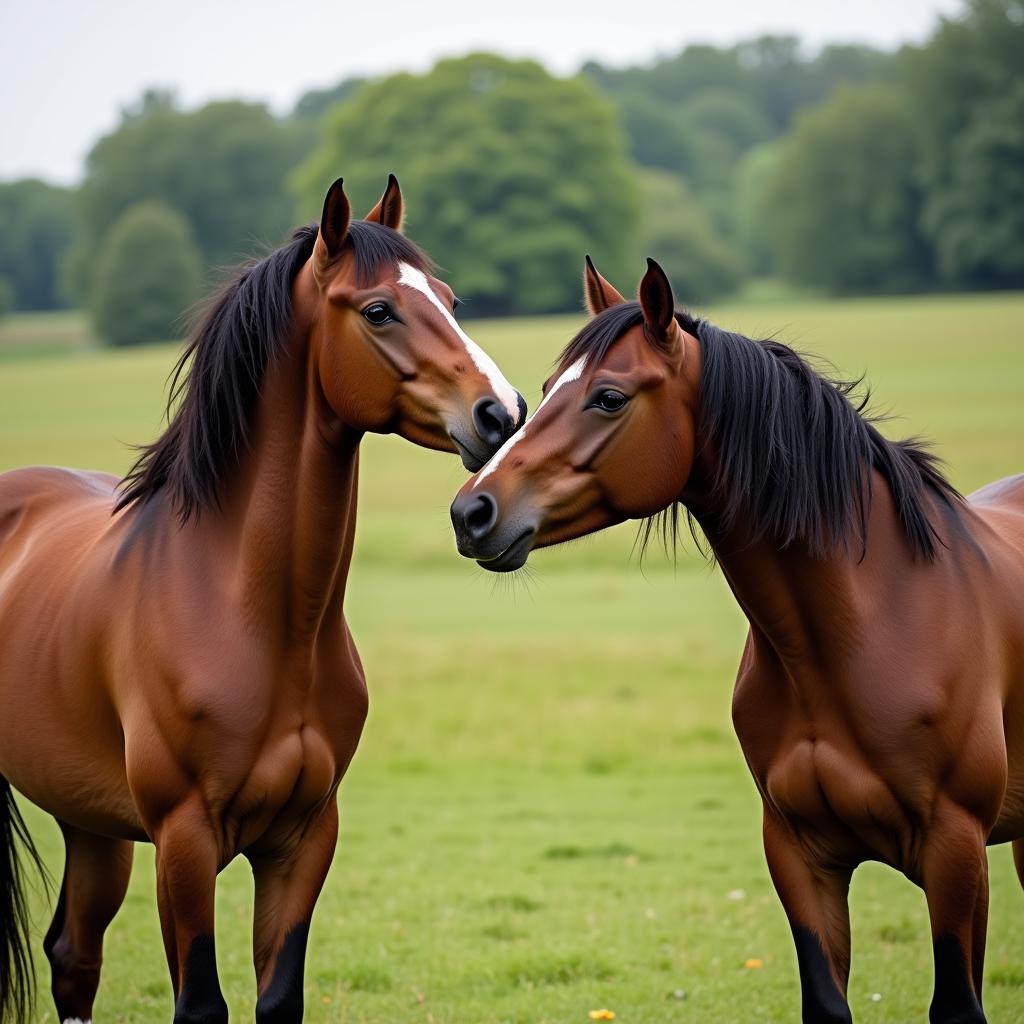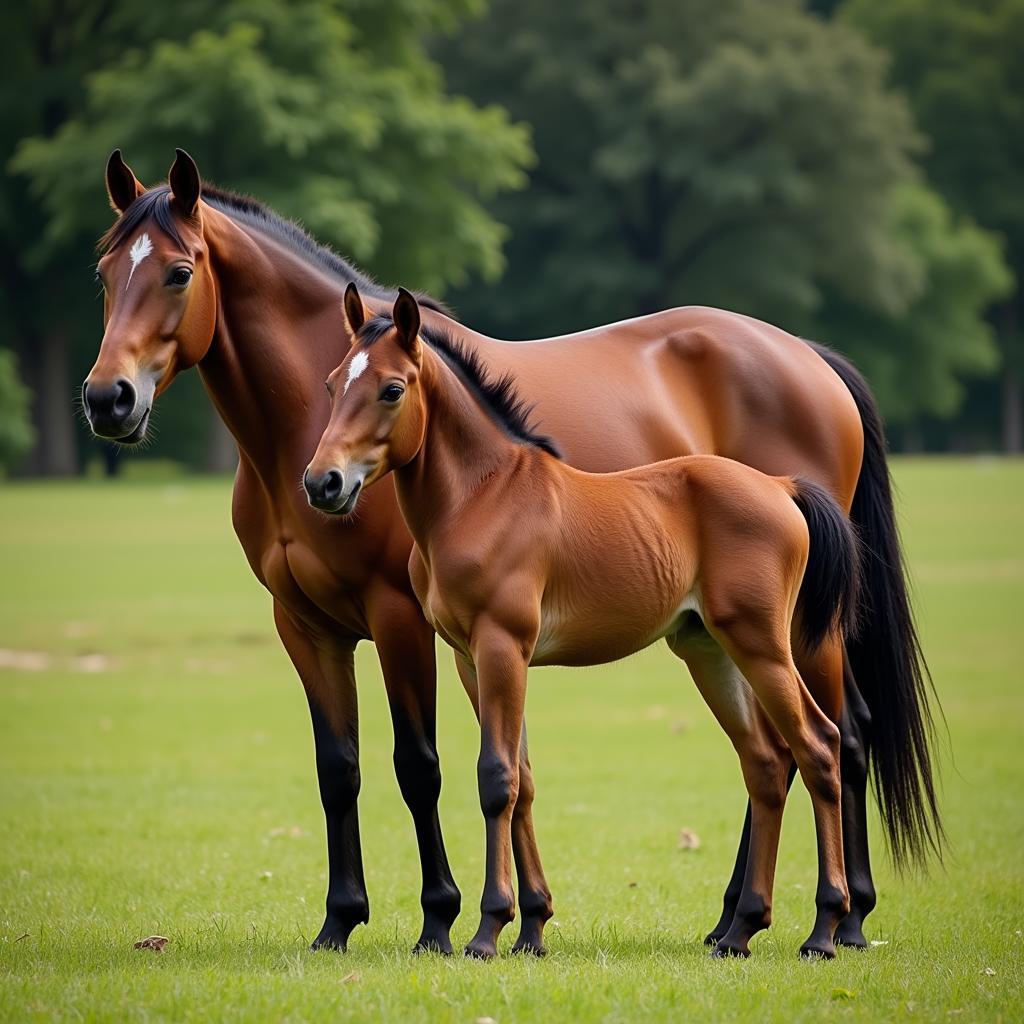The term “Horse Free Sex” often leads to misunderstandings and can be misinterpreted. While the phrase itself may suggest uninhibited mating, responsible horse ownership necessitates a careful and informed approach to breeding. This involves understanding the natural behaviors of horses, recognizing the ethical considerations, and prioritizing the health and well-being of the animals involved. free horses sex
Natural Mating Behaviors in Horses
Horses, like many other animals, have instinctive mating behaviors. In the wild, these behaviors are influenced by seasonal changes, social dynamics within the herd, and the mare’s estrous cycle. Understanding these natural processes is crucial for responsible breeding. Mares display various signs of estrus, also known as “heat,” which indicate their receptiveness to breeding. These signs include frequent urination, tail raising, and winking of the vulva. Stallions, on the other hand, exhibit behaviors like increased vocalizations, flehmen (curling of the upper lip), and attempts to mount the mare.
 Natural Horse Mating Behavior
Natural Horse Mating Behavior
Observing these natural cues is essential for determining the optimal time for breeding. Forced or untimely breeding can be stressful for both the mare and the stallion and may not result in successful conception.
Ethical Considerations in Horse Breeding
Breeding horses carries significant ethical responsibilities. Overpopulation is a real concern, and irresponsible breeding contributes to the problem of unwanted horses. Before breeding, it is crucial to consider the long-term welfare of the offspring. Will you be able to provide adequate care for the foal? Do you have the resources and facilities to raise a young horse? These are important questions that every responsible breeder must ask themselves. foster horses
Furthermore, breeding should always prioritize the health of both the mare and the stallion. Ensuring they are free from genetic diseases and have the appropriate temperament for breeding is paramount.
The Importance of Genetic Testing
Genetic testing plays a vital role in responsible breeding practices. It helps identify potential genetic disorders that could be passed down to the offspring. Conditions like Equine Recurrent Uveitis (ERU) and Hyperkalemic Periodic Paralysis (HYPP) can significantly impact a horse’s quality of life. By screening breeding animals, we can reduce the risk of these debilitating diseases.
Managing Horse Reproduction
While “horse free sex” might imply uncontrolled mating, responsible horse owners carefully manage reproduction. This includes selecting appropriate breeding pairs based on factors like pedigree, conformation, and temperament. It also involves providing a safe and controlled environment for breeding to occur. Artificial insemination is a common practice that allows breeders to carefully select genetics while minimizing the risks associated with natural mating. horse tail butt plug
Artificial Insemination in Horses
Artificial insemination offers numerous advantages, including reducing the risk of injury to both the mare and the stallion and allowing access to superior genetics from stallions located far away. This technique requires specialized equipment and expertise, but it has become a valuable tool for responsible horse breeding.
“Responsible breeding goes beyond simply allowing horses to mate freely,” explains Dr. Sarah Mitchell, a renowned equine veterinarian. “It requires careful planning, genetic testing, and a deep understanding of horse behavior.”
Conclusion: Breeding Horses Responsibly
The term “horse free sex” can be misleading. Responsible horse breeding involves careful management, ethical considerations, and a commitment to the well-being of the animals involved. Understanding natural behaviors, prioritizing health, and planning for the long-term care of the offspring are crucial aspects of ethical horse breeding. By taking a responsible approach, we can ensure the health and welfare of future generations of horses. 4 elf dark horse Remember, responsible breeding contributes to a healthy and sustainable horse population.
 Healthy Horse Foal
Healthy Horse Foal
FAQ
- What is the best age to breed a mare?
- What are the signs of estrus in a mare?
- What are the risks associated with horse breeding?
- How can I find a reputable horse breeder?
- What are the costs associated with breeding a horse?
- What are the legal requirements for breeding horses in my state?
- What is the average gestation period for a horse?
Need assistance? Contact us 24/7: Phone: 0772127271, Email: [email protected], or visit us at QGM2+WX2, Vị Trung, Vị Thuỷ, Hậu Giang, Việt Nam.